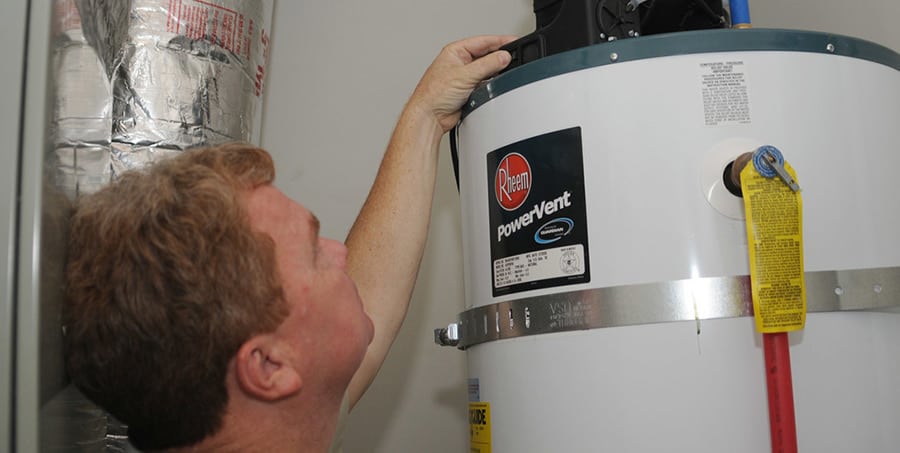Dealing with the Frequently Encountered Water Heater Emergencies
Dealing with the Frequently Encountered Water Heater Emergencies
Blog Article
They are making a few good points on the subject of Warning Signs You Need Water Heater Repairs as a whole in the article beneath.

A hot water heater is one of the most essential fundamental home appliances that can be found in a residence. With hot water heater, you don't need to undergo the stress and anxiety of home heating water manually each time there is a demand to take a bath, do the laundry, or the recipes. Nevertheless, there is constantly a possibility that your hot water heater would act up similar to a lot of mechanical devices.
It is very important to note any type of little malfunction and also tackle it rapidly prior to things leave hand. Many times, your hot water heater starts to malfunction when there is a build-up of debris as a result of continual usage. As a precaution, routine flushing of your water heater is suggested to avoid debris build-up and also prevent practical failing.
Usual water heater emergency situations and exactly how to handle them
Insufficient hot water
It might be that the water heating unit can't sustain the hot water demand for your apartment or condo. You might update your water heating unit to one with a larger ability.
Changing water temperature level.
Your water heating system could begin creating water of various temperature levels typically ice hot or cold hot. There might be a requirement to change either the thermostat or the heating system of your water heating system.
Dripping water heater tank.
In this situation, you must turn off your water heating unit, enable it to cool down, and also carefully look for the source of the trouble. At times, all you need to do is to tighten a few screws or pipe connections in situations of minor leakages. If this does not work and the leakage lingers, you may need to employ the services of a service technician for an ideal substitute.
Tarnished or odiferous water
When this takes place, you require to understand if the concern is from the water or the storage tank source. If there is no amusing smell when you run cool water, after that you are certain that it is your water heating system that is malfunctioning. The odiferous water can be created by corrosion or the build-up of germs or sediments in the water heater storage tank.
Final thought
Some homeowners ignore little caution and minor faults in their hot water heater device. This only causes further damages and a feasible total failure of your device. You ought to deal with your hot water heater faults as quickly as they come up to stay clear of even more expenditures and also unneeded emergency difficulties.
With water heaters, you don't require to go via the stress and anxiety of heating water by hand every time there is a requirement to take a bath, do the washing, or the meals. It might be that the water heating unit can not support the warm water need for your house. Your water heating unit can start generating water of different temperatures normally ice chilly or scalding hot. If there is no amusing scent when you run cold water, then you are certain that it is your water heating system that is defective. The stinky water can be triggered by rust or the build-up of microorganisms or debris in the water heating unit tank.
Common Water Heater Issues and What You Should Do
What Type of Water Heater Do You Have?
Before we begin it’s first important that you identify the type of water heater you have on your property. There are two main types of water heaters out there: conventional and high efficiency.
Both of these types of products typically use either gas or electricity to heat power. There are also solar water heaters that use a thermal collector on the roof or yard to heat the water.
While these models are not as common, they can cut heating costs in half. In this article, we will focus on conventional and high efficiency.
How Do My Electric and Gas Water Heater Work?
Though they look similar, electric and gas water heaters work very differently. It’s important to know their basic function because often problems can be specific to the heating source.
In the electric model, a thermostat on the side of the machine detects the temperature of the water in the tank. When the temperature needs to rise electricity flows to a heating element suspended in the water.
Gas models also use a thermostat device — typically with a mercury sensor at the tip and an additional sensor called a thermocouple. The thermocouple detects whether the pilot light is on and controls the flow of gas.
When the thermostat drops below the appropriate level gas is released which becomes ignited by the pilot light. The flame heats the bottom of the water tank which causes hot water to rise and cold water to drop.
This natural circulation continues until the water reaches the desired temperature. Then, the thermostat triggers the gas control valve to shut off the flow of gas.
What Are the Most Common Issues and How Do You Fix Them?
https://happyhiller.com/blog/common-water-heater-issues-and-what-you-should-do/

As an enthusiastic person who reads on The Importance of Water Heater Maintenance, I assumed sharing that piece of content was a great idea. Do you know somebody who is fascinated about the niche? Be sure promote it. I value reading our article about Warning Signs You Need Water Heater Repairs.
Superior emergency plumbing? We're here. Report this page